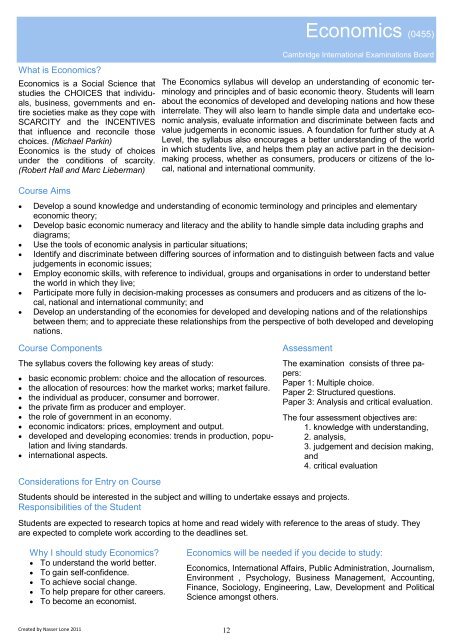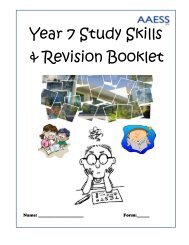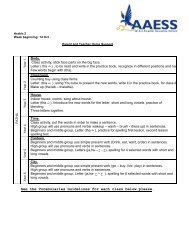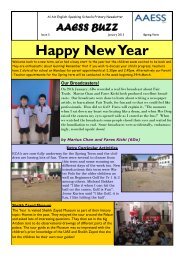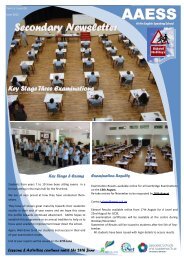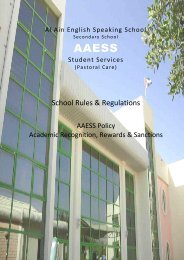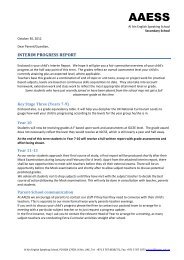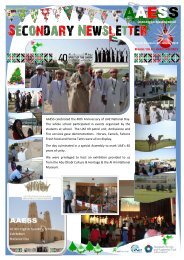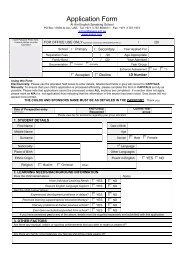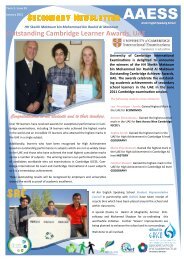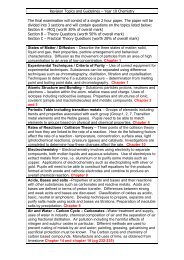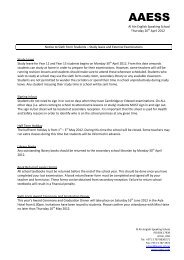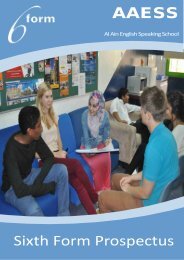AAESS IGCSE Options Booklet - Al Ain English Speaking School ...
AAESS IGCSE Options Booklet - Al Ain English Speaking School ...
AAESS IGCSE Options Booklet - Al Ain English Speaking School ...
You also want an ePaper? Increase the reach of your titles
YUMPU automatically turns print PDFs into web optimized ePapers that Google loves.
What is Economics?<br />
Economics is a Social Science that<br />
studies the CHOICES that individuals,<br />
business, governments and entire<br />
societies make as they cope with<br />
SCARCITY and the INCENTIVES<br />
that influence and reconcile those<br />
choices. (Michael Parkin)<br />
Economics is the study of choices<br />
under the conditions of scarcity.<br />
(Robert Hall and Marc Lieberman)<br />
Course Aims<br />
Develop a sound knowledge and understanding of economic terminology and principles and elementary<br />
economic theory;<br />
Develop basic economic numeracy and literacy and the ability to handle simple data including graphs and<br />
diagrams;<br />
Use the tools of economic analysis in particular situations;<br />
Identify and discriminate between differing sources of information and to distinguish between facts and value<br />
judgements in economic issues;<br />
Employ economic skills, with reference to individual, groups and organisations in order to understand better<br />
the world in which they live;<br />
Participate more fully in decision-making processes as consumers and producers and as citizens of the local,<br />
national and international community; and<br />
Develop an understanding of the economies for developed and developing nations and of the relationships<br />
between them; and to appreciate these relationships from the perspective of both developed and developing<br />
nations.<br />
Course Components<br />
The syllabus covers the following key areas of study:<br />
basic economic problem: choice and the allocation of resources.<br />
the allocation of resources: how the market works; market failure.<br />
the individual as producer, consumer and borrower.<br />
the private firm as producer and employer.<br />
the role of government in an economy.<br />
economic indicators: prices, employment and output.<br />
developed and developing economies: trends in production, population<br />
and living standards.<br />
international aspects.<br />
Considerations for Entry on Course<br />
12<br />
Economics (0455)<br />
Cambridge International Examinations Board<br />
The Economics syllabus will develop an understanding of economic terminology<br />
and principles and of basic economic theory. Students will learn<br />
about the economics of developed and developing nations and how these<br />
interrelate. They will also learn to handle simple data and undertake economic<br />
analysis, evaluate information and discriminate between facts and<br />
value judgements in economic issues. A foundation for further study at A<br />
Level, the syllabus also encourages a better understanding of the world<br />
in which students live, and helps them play an active part in the decisionmaking<br />
process, whether as consumers, producers or citizens of the local,<br />
national and international community.<br />
Assessment<br />
Students should be interested in the subject and willing to undertake essays and projects.<br />
Responsibilities of the Student<br />
The examination consists of three papers:<br />
Paper 1: Multiple choice.<br />
Paper 2: Structured questions.<br />
Paper 3: Analysis and critical evaluation.<br />
The four assessment objectives are:<br />
1. knowledge with understanding,<br />
2. analysis,<br />
3. judgement and decision making,<br />
and<br />
4. critical evaluation<br />
Students are expected to research topics at home and read widely with reference to the areas of study. They<br />
are expected to complete work according to the deadlines set.<br />
Why I should study Economics?<br />
To understand the world better.<br />
To gain self-confidence.<br />
To achieve social change.<br />
To help prepare for other careers.<br />
To become an economist.<br />
Created by Nasser Lone 2011<br />
Economics will be needed if you decide to study:<br />
Economics, International Affairs, Public Administration, Journalism,<br />
Environment , Psychology, Business Management, Accounting,<br />
Finance, Sociology, Engineering, Law, Development and Political<br />
Science amongst others.


